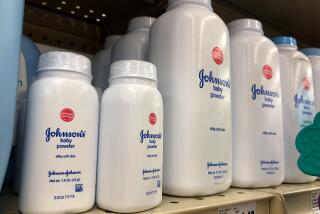FTC targets Pom juice health claims
- Share via
Reporting from Los Angeles and Washington —
The Federal Trade Commission has filed a complaint against Los Angeles-based pomegranate juice maker Pom Wonderful and its billionaire owners, Lynda and Stewart Resnick, alleging that they violated federal law by making “false and unsubstantiated claims” about the health benefits of their products.
Since its launch in 2002, the garnet-red juice in the curvy little bottle gave way to a marketing craze of flavored fruit teas, martinis and salad dressings — a culinary boom bolstered by Pom’s products advertised as helping to treat conditions including heart disease, prostate cancer and erectile dysfunction. The company, according to its website, has spent more than $34 million to back pomegranate-based scientific research.
In a complaint filed Monday, however, the commission was skeptical. It questioned the scientific methods used in the studies and alleged they did not find evidence showing the products to be effective against certain diseases.
“Any consumer who sees Pom Wonderful products as a silver bullet against disease has been misled,” David Vladeck, director of the FTC’s Bureau of Consumer Protection, said in a statement.
The complaint — which also named Pom’s parent company, Roll International Corp., and company President Matthew Tupper — marks the latest salvo in an ongoing campaign by the federal agency to uncover false health claims in food advertising.
In recent months, the commission forced Nestle to halt an ad campaign for a drink called Boost Kid Essentials that claimed it would keep children from getting sick and missing school. It also required Kellogg Co. to stop making claims that nutrients in its Rice Krispies cereal improved kids’ immunity and that its Frosted Mini-Wheats cereal was “clinically shown to improve kids’ attentiveness by nearly 20%.”
With Pom, the FTC cited a number of advertisements as being misleading on its websites, in national print outlets and elsewhere. The commission also pointed to Lynda Resnick, the driver behind the company’s marketing juggernaut, and raised concerns over comments she made during media interviews.
On “The Martha Stewart Show,” Resnick said Pom was “the magic elixir of our age and of all ages, and we know that it helps circulation, it helps Alzheimer’s, it helps all sorts of things in the body.” She reportedly told a Newsweek reporter, “It’s also 40% as effective as Viagra.”
In a statement released Monday, Pom Wonderful said that the FTC’s allegations were “completely unwarranted,” and that the company had a constitutionally protected right “to communicate the promising results of our extensive scientific research program on pomegranates.”
The Resnicks could not be reached for comment.
The Beverly Hills couple has built an agribusiness empire over the last three decades that includes Fiji Water; Teleflora, the nation’s biggest flower-delivery service; Paramount Farming Co., the world’s largest supplier of almonds and pistachios, in California’s Central Valley; and Paramount Citrus, the leading producer of fresh citrus in the U.S.
While the Resnicks have been lauded for a recent $45-million donation to the Los Angeles County Museum of Art, they have garnered heavy criticism for the environmental consequences of their Fiji Water operations and for their role in an underground water storage project in Central California that the state had already spent $75 million to develop.
Monday’s complaint also underscores a months-long battle that has been brewing among the Resnicks, Pom and two federal regulatory agencies.
In February, the Food and Drug Administration sent Pom a warning letter: By making specific claims that the juice treated maladies connected to heart, prostate and erectile function, the company was in effect selling a drug, which therefore was subject to clinical trials and other testing.
And two weeks ago, Pom Wonderful filed a lawsuit against the FTC, accusing the commission of overstepping its authority. The complaint alleged that the FTC was imposing a new, unfair standard on food and supplement producers by requiring them to get FDA approval for claims involving effectiveness in treating disease.
The FTC disputed Pom’s allegations. An FDA spokeswoman said the agency’s case against Pom Wonderful remained open.
azajac@latimes.com
More to Read
Inside the business of entertainment
The Wide Shot brings you news, analysis and insights on everything from streaming wars to production — and what it all means for the future.
You may occasionally receive promotional content from the Los Angeles Times.










